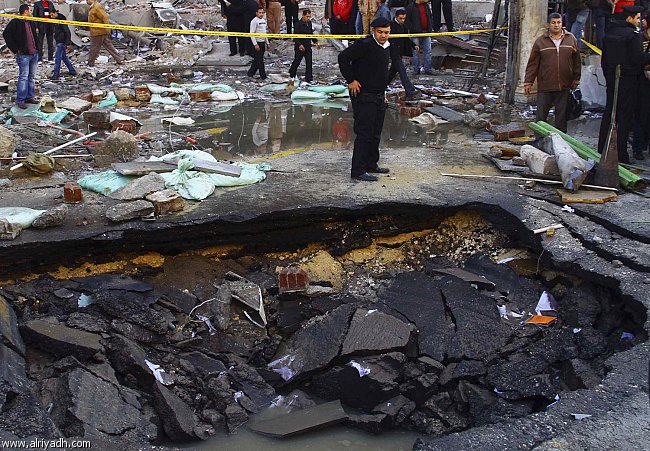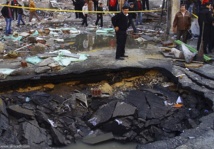They struck a day before police were to deploy across the capital for the third anniversary of the Arab Spring uprising that unseated autocratic president Hosni Mubarak.
Security cameras captured the first attack, after a white pick-up truck pulled up outside the security directorate, and the driver emerged to get into a waiting car.
Soon after, two police officers can be seen inspecting the vehicle and walking into the headquarters, moments before the explosion covered the screen in a flash of smoke and flames.
Police confirmed the authenticity of the footage aired by Egyptian media, adding the guards in the video had gone inside to raise the alarm.
The blast, which badly damaged the facade of the building and left a gaping crater in the ground, killed four people and wounded dozens.
"Casualties were relatively small (despite) the size of the blast," said interior ministry spokesman Hany Abdel Latif.
Friday is the Muslim day of prayer and rest, and so relatively few people were on the streets.
The bombing also hit the nearby Museum of Islamic Art, bringing down its ceilings and damaging exhibits.
Hours later, a makeshift bomb exploded near a police vehicle close to a metro station at Dokki, in west Cairo, killing a police conscript, officials said.
Two more bombs went off hours apart close to the Giza pyramids, one killing a person and wounding four conscripts and the other striking outside a police station without causing any casualties.
The president's office vowed to "avenge our martyrs".
"Whoever planned, participated, financed, or incited (the attack) will be punished with the worst form of punishment," it said.
Later, at least 14 people were killed when Islamist protesters clashed with their civilian opponents and police in several cities, reports said.
Islamist supporters of Morsi have called for mass protests against the new regime.
The assailants "don't want the people to celebrate" the anniversary, said interior minister Mohamed Ibrahim, who has urged rival demonstrations.
'Violence won't bring democracy'
EU foreign policy chief Catherine Ashton, who had tried unsuccessfully to mediate between Morsi's supporters and the interim government in August, condemned the bombings.
"Violence will not bring Egypt any closer to the people's desire for a democratic country," she said.
The pro-Morsi National Pro-Legitimacy Alliance also condemned the bombings but said it would go ahead with its "peaceful struggle against (the) coup".
The deadliest bombings since Morsi's overthrow have been claimed by Ansar Beit al-Maqdis, a Qaeda-inspired group led by Bedouin militants in the Sinai Peninsula.
"The first bombing... has Ansar Beit al-Maqdis's name all over it," said David Barnett of the Foundation for the Defence of Democracies think-tank.
"The latter three might be different actors trying to take advantage of the situation."
A resident who lives about 200 metres (yards) from the police headquarters said he had been awakened by the explosion.
"My building shook," said Yahya Attiya.
Riot police pushed back hundreds of onlookers, some of whom chanted slogans against Morsi's Muslim Brotherhood.
Others carried Egyptian flags and posters of army chief Abdel Fattah al-Sisi, the general who overthrew Morsi.
The Brotherhood was blacklisted as a terrorist group after 15 people were killed when a suicide bomber blew up a vehicle at a police headquarters north of Cairo in December.
Ansar Beit al-Maqdis claimed that attack.
Scores of soldiers and police have been killed in the Sinai, and militants in the desert region have begun to expand their operations to densely populated areas along the Nile.
On Thursday, masked assailants on motorbikes gunned down five policemen south of Cairo.
There have also been bombings in Cairo, including a failed assassination attempt against the interior minister in September, weeks after policemen killed hundreds of Islamist demonstrators at a protest camp.
More than 1,000 people, mostly Islamists, have been killed in violence since Morsi's overthrow. Thousands more have been jailed, including Morsi and other Brotherhood leaders.
-------------------------------------------------------------------------
Security cameras captured the first attack, after a white pick-up truck pulled up outside the security directorate, and the driver emerged to get into a waiting car.
Soon after, two police officers can be seen inspecting the vehicle and walking into the headquarters, moments before the explosion covered the screen in a flash of smoke and flames.
Police confirmed the authenticity of the footage aired by Egyptian media, adding the guards in the video had gone inside to raise the alarm.
The blast, which badly damaged the facade of the building and left a gaping crater in the ground, killed four people and wounded dozens.
"Casualties were relatively small (despite) the size of the blast," said interior ministry spokesman Hany Abdel Latif.
Friday is the Muslim day of prayer and rest, and so relatively few people were on the streets.
The bombing also hit the nearby Museum of Islamic Art, bringing down its ceilings and damaging exhibits.
Hours later, a makeshift bomb exploded near a police vehicle close to a metro station at Dokki, in west Cairo, killing a police conscript, officials said.
Two more bombs went off hours apart close to the Giza pyramids, one killing a person and wounding four conscripts and the other striking outside a police station without causing any casualties.
The president's office vowed to "avenge our martyrs".
"Whoever planned, participated, financed, or incited (the attack) will be punished with the worst form of punishment," it said.
Later, at least 14 people were killed when Islamist protesters clashed with their civilian opponents and police in several cities, reports said.
Islamist supporters of Morsi have called for mass protests against the new regime.
The assailants "don't want the people to celebrate" the anniversary, said interior minister Mohamed Ibrahim, who has urged rival demonstrations.
'Violence won't bring democracy'
EU foreign policy chief Catherine Ashton, who had tried unsuccessfully to mediate between Morsi's supporters and the interim government in August, condemned the bombings.
"Violence will not bring Egypt any closer to the people's desire for a democratic country," she said.
The pro-Morsi National Pro-Legitimacy Alliance also condemned the bombings but said it would go ahead with its "peaceful struggle against (the) coup".
The deadliest bombings since Morsi's overthrow have been claimed by Ansar Beit al-Maqdis, a Qaeda-inspired group led by Bedouin militants in the Sinai Peninsula.
"The first bombing... has Ansar Beit al-Maqdis's name all over it," said David Barnett of the Foundation for the Defence of Democracies think-tank.
"The latter three might be different actors trying to take advantage of the situation."
A resident who lives about 200 metres (yards) from the police headquarters said he had been awakened by the explosion.
"My building shook," said Yahya Attiya.
Riot police pushed back hundreds of onlookers, some of whom chanted slogans against Morsi's Muslim Brotherhood.
Others carried Egyptian flags and posters of army chief Abdel Fattah al-Sisi, the general who overthrew Morsi.
The Brotherhood was blacklisted as a terrorist group after 15 people were killed when a suicide bomber blew up a vehicle at a police headquarters north of Cairo in December.
Ansar Beit al-Maqdis claimed that attack.
Scores of soldiers and police have been killed in the Sinai, and militants in the desert region have begun to expand their operations to densely populated areas along the Nile.
On Thursday, masked assailants on motorbikes gunned down five policemen south of Cairo.
There have also been bombings in Cairo, including a failed assassination attempt against the interior minister in September, weeks after policemen killed hundreds of Islamist demonstrators at a protest camp.
More than 1,000 people, mostly Islamists, have been killed in violence since Morsi's overthrow. Thousands more have been jailed, including Morsi and other Brotherhood leaders.
-------------------------------------------------------------------------









 Home
Home Politics
Politics











